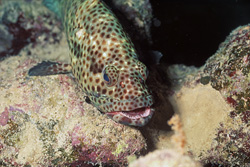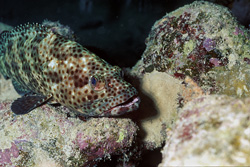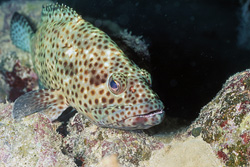Discover the Brown-spotted Grouper: Behavior, Habitat, and Ecological Significance in Marine Ecosystems
The Brown-spotted Grouper (Epinephelus tauvina) is a remarkable species of fish native to the warm waters of the Indo-Pacific region. With its distinctive brown spotted pattern, this predatory fish plays a crucial role in coral reef ecosystems, acting as an apex predator that maintains the balance of marine biological communities. Reaching up to 75 cm in length, the Brown-spotted Grouper is known for its robust, spiny dorsal fins, which it erects when threatened, serving as a defense mechanism. This adaptation makes it a fascinating subject for studies in fish ecology. Its diet primarily consists of smaller fish and crustaceans, which it skillfully hunts within the hidden nooks of the reefs. The habitat of this species is highly dependent on the health of coral ecosystems, rendering them particularly susceptible to environmental changes such as coral bleaching and human activities. Conservation efforts for the Brown-spotted Grouper are therefore indicative of the overall health of marine biodiversity in the regions they inhabit. Additionally, there are indications that consuming this fish may be associated with the risk of Ciguatera poisoning, a toxin-induced fish poisoning. For more detailed information and the current conservation status of the Epinephelus tauvina, please refer to the IUCN Red List of Threatened Species.



